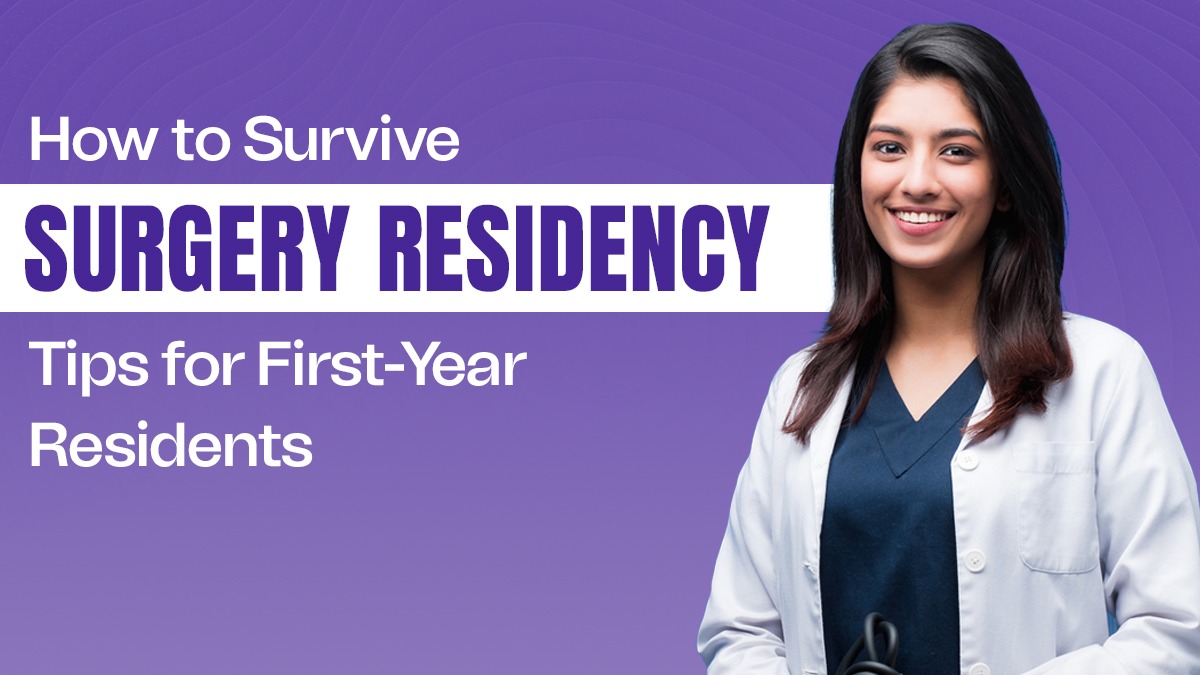Estimated reading time: 4 minutes
Starting a surgery residency is rewarding yet overwhelming. The transition from a medical college to a first-year residency is intense, demanding, and often emotionally draining. In the first or second year of the surgery residency, or even in a structured residency program, being prepared, being positive, and working smart are key factors in excelling.
Some ground-level tips to help you not just survive but ace your surgery residency program.
1. Be Ready to Learn — Fast and Constantly
- Your first-year residency will expose you to real clinical decision-making and working in teams under stressful situations.
- As a junior resident doctor, you will have a steep learning curve. Learn from your feedback, read around your cases, and ask the tricky questions.
- The finest surgery residents are lifelong learners.
2. Get Very Good at the Basics Early On
- In your starting years, learning things earlier matters a lot.
- Learn how to do wound care, line insertions, suturing, pre-op prep inside out and backwards.
- Those basic skills will get you trusted and respected on the floor-from consultants to nurses!
3. Be A Good Communicator
- Residency is not just about knowing the disease and how to treat it. It is about being able to communicate your ideas so others understand.
- Keep your teammates in the loop, present succinct cases, and keep neat notes.
- Communication is how people learn to trust you and cut down on errors.
4. Take Care of Your Physical and Mental Health
- Internship programs can be stressful and physically demanding. Sleep loss, erratic eating habits, and emotional exhaustion are some of the adversities residents experience.
- Remain healthy and take care of yourself.
- When overburdened, you can step out for a short walk, eat clean, or just chat with some fellow doctors.
- Some hospitals even provide counsellors, so do not hesitate if you feel the need.
5. Document Everything and Clear Communication
- One particular skill required in every residency surgery program is to offer excellent patient care—the documentation of clinical findings or treatment decisions, and handovers is key.
- Communicate clearly during handovers with the incoming team.
- Miscommunication is the number-one reason behind medical errors in residency training.
6. Understand Your Patients
- Those whom you would like to consider as the best residents stand out because they understand each detail of their patients.
- They know their diagnosis, treatment plan, progress, and concerns to help them better care for their patients and gain the confidence of their seniors.
- A medicine internship is one in which clinical skills are built individually by working on each patient; therefore, consider every patient as an opportunity to learn.
7. Respect and Foster Team Relationships
- From nurses and ward boys to consultants, treat every member of the healthcare team with respect. A great team set-up will make your job easier and improve patient outcomes.
- Having your peers as support will be one of your greatest strengths during your residency program. Sharing your experiences, discussing difficult cases.
- Your peers will be an important support system throughout your residency training. Sharing experiences, discussing cases, especially difficult cases, helps create a network of reciprocity and mutual support.
8. Academically Active, but Selectively
- Try to resist the temptation of buying every standard textbook or booking every seminar. Smart studying is more efficient.
- Go for resources that are brief and clinically relevant. Concentrate on high-yield issues you face in ward work.
- Residency, after all, is more than simply academic—it is about knowledge application in real time. Give a good balance to both.
9. Embrace the Struggle—It Is Worth It
- There will be hard days- missed meals, sleepless nights, emotional breakdowns. But eventually, this phase transforms you.
- Every difficult shift adds to your resilience. Every patient teaches you a new lesson.
- Medicine residency will trouble you, but it will shape you into a self-assured and competent physician.
Conclusion:
Halfway through your residency year, the first year residency is no longer a mere rite of passage; it is a period of accelerated growth. The surgery residency program demands from you: resilience, curiosity, collaboration, and compassion. Trust the process; learn from every experience; and remember, you’re never alone.
Thousands of junior resident doctors have walked this path down before-you will walk it as well.

